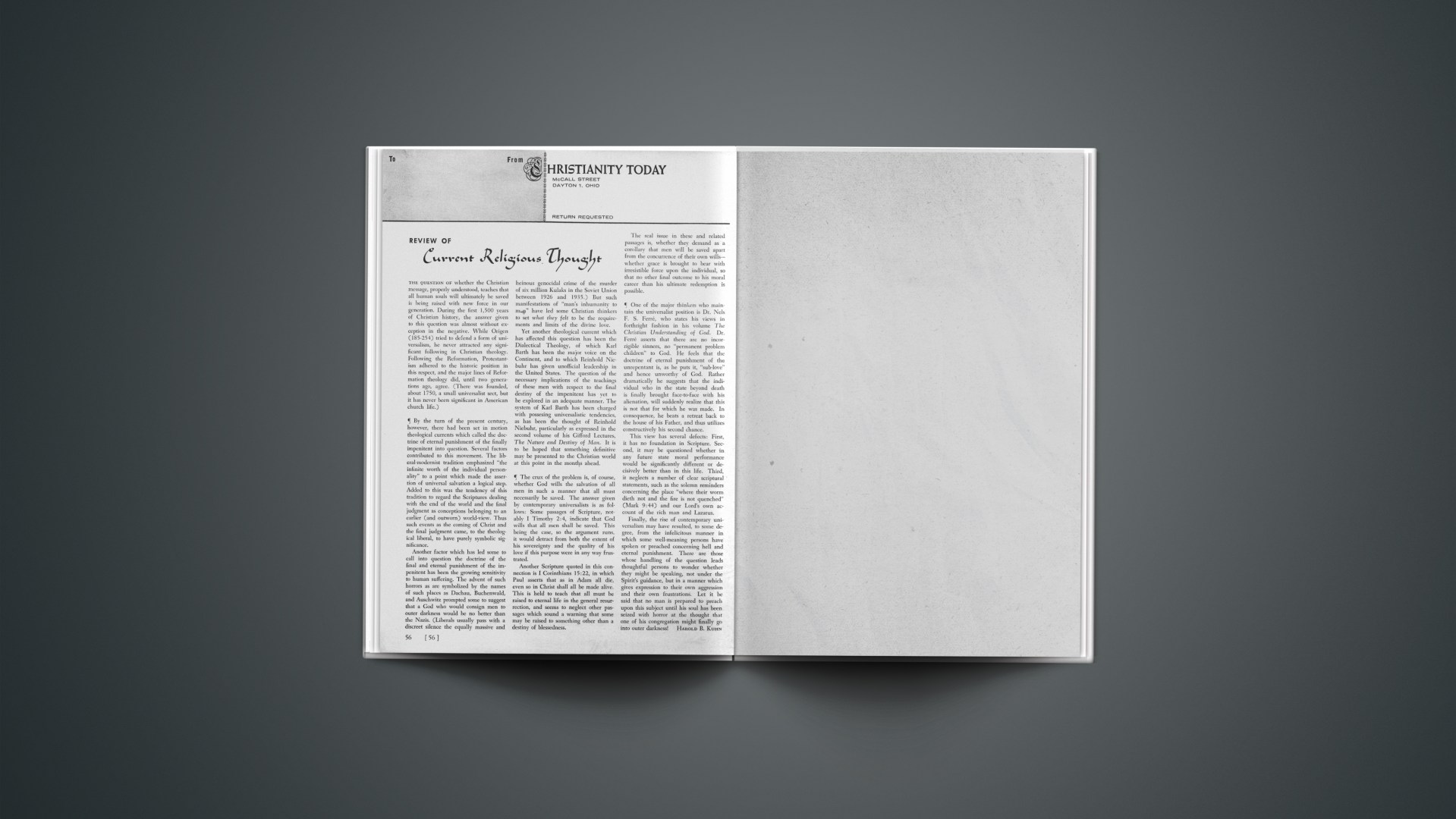The question of whether the Christian message, properly understood, teaches that all human souls will ultimately be saved is being raised with new force in our generation. During the first 1,500 years of Christian history, the answer given to this question was almost without exception in the negative. While Origen (185–254) tried to defend a form of universalism, he never attracted any significant following in Christian theology. Following the Reformation, Protestantism adhered to the historic position in this respect, and the major lines of Reformation theology did, until two generations ago, agree. (There was founded, about 1750, a small universalist sect, but it has never been significant in American church life.)
By the turn of the present century, however, there had been set in motion theological currents which called the doctrine of eternal punishment of the finally impenitent into question. Several factors contributed to this movement. The liberal-modernist tradition emphasized “the infinite worth of the individual personality” to a point which made the assertion of universal salvation a logical step. Added to this was the tendency of this tradition to regard the Scriptures dealing with the end of the world and the final judgment as conceptions belonging to an earlier (and outworn) world-view. Thus such events as the coming of Christ and the final judgment came, to the theological liberal, to have purely symbolic significance.
Another factor which has led some to call into question the doctrine of the final and eternal punishment of the impenitent has been the growing sensitivity to human suffering. The advent of such horrors as are symbolized by the names of such places as Dachau, Buchenwald, and Auschwitz prompted some to suggest that a God who would consign men to outer darkness would be no better than the Nazis. (Liberals usually pass with a discreet silence the equally massive and heinous genocidal crime of the murder of six million Kulaks in the Soviet Union between 1926 and 1935.) But such manifestations of “man’s inhumanity to man” have led some Christian thinkers to set what they felt to be the requirements and limits of the divine love.
Yet another theological current which has affected this question has been the Dialectical Theology, of which Karl Barth has been the major voice on the Continent, and to which Reinhold Niebuhr has given unofficial leadership in the United States. The question of the necessary implications of the teachings of these men with respect to the final destiny of the impenitent has yet to be explored in an adequate manner. The system of Karl Barth has been charged with possesing universalistic tendencies, as has been the thought of Reinhold Niebuhr, particularly as expressed in the second volume of his Gifford Lectures, The Nature and Destiny of Man. It is to be hoped that something definitive may be presented to the Christian world at this point in the months ahead.
The crux of the problem is, of course, whether God wills the salvation of all men in such a manner that all must necessarily be saved. The answer given by contemporary universalists is as follows: Some passages of Scripture, notably 1 Timothy 2:4, indicate that God wills that all men shall be saved. This being the case, so the argument runs, it would detract from both the extent of his sovereignty and the quality of his love if this purpose were in any way frustrated.
Another Scripture quoted in this connection is 1 Corinthians 15:22, in which Paul asserts that as in Adam all die, even so in Christ shall all be made alive. This is held to teach that all must be raised to eternal life in the general resurrection, and seems to neglect other passages which sound a warning that some may be raised to something other than a destiny of blessedness.
The real issue in these and related passages is, whether they demand as a corollary that men will be saved apart from the concurrence of their own wills—whether grace is brought to bear with irresistible force upon the individual, so that no other final outcome to his moral career than his ultimate redemption is possible.
One of the major thinkers who maintain the universalist position is Dr. Nels F. S. Ferré, who states his views in forthright fashion in his volume The Christian Understanding of God. Dr. Ferré asserts that there are no incorrigible sinners, no “permanent problem children” to God. He feels that the doctrine of eternal punishment of the unrepentant is, as he puts it, “sub-love” and hence unworthy of God. Rather dramatically he suggests that the individual who in the state beyond death is finally brought face-to-face with his alienation, will suddenly realize that this is not that for which he was made. In consequence, he beats a retreat back to the house of his Father, and thus utilizes constructively his second chance.
This view has several defects: First, it has no foundation in Scripture. Second, it may be questioned whether in any future state moral performance would be significantly different or decisively better than in this life. Third, it neglects a number of clear scriptural statements, such as the solemn reminders concerning the place “where their worm dieth not and the fire is not quenched” (Mark 9:44) and our Lord’s own account of the rich man and Lazarus.
Finally, the rise of contemporary universalism may have resulted, to some degree, from the infelicitous manner in which some well-meaning persons have spoken or preached concerning hell and eternal punishment. There are those whose handling of the question leads thoughtful persons to wonder whether they might be speaking, not under the Spirit’s guidance, but in a manner which gives expression to their own aggression and their own frustrations. Let it be said that no man is prepared to preach upon this subject until his soul has been seized with horror at the thought that one of his congregation might finally go into outer darkness!










